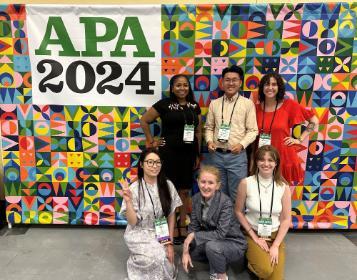About IncLab
IncLab is located within a counseling psychology program whose work bears the additional influence of theoretical and philosophical psychology. Principles from both those traditions can be seen in our scholarship. The summaries below are taken from the mission statements of The Society of Counseling Psychology (APA Division 17) and The Society for Theoretical and Philosophical Psychology (APA Division 24).
Counseling Psychology
The Society for Counseling Psychology shares a commitment to a holistic psychological perspective that is strengths-based, person- and community-centered, systems-oriented, contextually aware, and integrative of vocational and lifespan issues.
Counseling psychology values include:
- Considering context in conceptualizing individuals, communities, problems, and interventions
- Fostering theory and research that rely on diverse methods and approaches
- Developing and implementing research, practice, training, and policies that are culturally relevant and sensitive to the needs of international populations and organizations.
Theoretical and Philosophical Psychology
The Society for Theoretical and Philosophical Psychology encourages and facilitates informed exploration and discussion of psychological theories and issues in both their scientific and philosophical dimensions and interrelationships.
The Society engages the philosophical and metatheoretical dimensions of psychology. The Society [is]... committed to representing and fostering diverse perspectives regarding ontological, epistemological, ethical, and critical issues within disciplinary psychology.
Included in the Society's diverse forms of inquiry are conceptual, speculative, theoretical, empirical, clinical, historical, literary, and cultural research.
How these principles have shaped our work
 We study and problematize the ways that conventional theories and assumptions about knowledge, knowledge-creation, and expertise can hinder our understanding of people's experiences.
We study and problematize the ways that conventional theories and assumptions about knowledge, knowledge-creation, and expertise can hinder our understanding of people's experiences.
"How is race constituted within the [health disparities] literature, and what is the impact of this discursive construction? What interests are served by this particular way of investigating race, even when it is employed by pro-equity psychologists? What light can it shed on the operation of similar assumptions throughout other areas of psychological research?... [W]e will ground this analysis within Foucauldian concepts of discourse as communicative action." (Smith, Madon, Gordon, Asencio, Xu, & Sheffey, 2023, p. 2 / Psychology, Race, and the 'Politics of Truth'")
We study the impact of psychological attention (or lack thereof) to poverty upon our services and upon public policy more broadly.
"[O]ur knowledge about effective practice in the context of poverty is scattered and disparate... How well prepared do practitioners feel for this work, and what innovations have they developed in order to work most effectively with their clients? What has working with people in poverty meant for these clinicians, and what can our profession learn from their experiences? In the present study, we set out to address these questions with the goal of adding to the field’s understanding of effective mental health practice in the context of poverty." (Smith, Li, Dykema, Hamlet, & Shellman, 2013, p. 140 / “Honoring Somebody that Society Doesn’t Honor”: Therapists Working in the Context of Poverty)
We value qualitative and participatory methods as ways of amplifying the knowledge and experiences of individuals who are often studied but rarely included in knowledge production.
"As researchers interested in issues of poverty, we believe that the expansion of frameworks of interpersonal oppression to encompass class-based discrimination is crucial.... Our intention was to make use of a methodology that would allow us to begin building knowledge in this area from the voices of poor and working-class people themselves.' (Smith, Mao, & Deshpande, 2016, p. 132 / Talking Across Worlds: Classist Microaggressions and Higher Education)
We have collaborated with dozens of schools and community-based organizations in participatory action research (PAR) projects.
"PAR is best-known as a methodological approach in which university researchers do not conduct studies on community members; rather, they conduct studies with community members. The word participatory, therefore, refers to the collaboration of all these stakeholders in identifying, studying, and creating knowledge about issues of local importance, while the word action signifies the initiation of positive local change based upon this knowledge. Participatory research collaborations hold promise for shared agency in the creation and expression of knowledge—a sphere of influence that has traditionally belonged almost entirely to academicians, professional researchers, and other privileged groups." (Smith, Shenk, Tran, Poon, Wahba, & Voegtli, 2017, p. 413 / “There’s not a rug big enough to hide us under": Participatory Action Research as Anti-Ageist Psychological Practice)